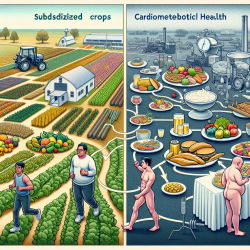Understanding the Impact of Subsidized Crops on Cardiometabolic Health
As a practitioner committed to improving health outcomes, understanding the intricate relationship between diet and health is crucial. Recent research titled "Consumption of Foods Derived from Subsidized Crops Remains Associated with Cardiometabolic Risk: An Update on the Evidence Using the National Health and Nutrition Examination Survey 2009–2014" sheds light on how agricultural policies may influence public health, particularly concerning cardiometabolic risks.
Key Findings from the Research
The study utilized data from the National Health and Nutrition Examination Survey (NHANES) between 2009 and 2014 to assess the impact of consuming foods derived from subsidized crops. The research focused on seven key subsidized commodities: corn, soybeans, wheat, rice, sorghum, dairy, and livestock. A subsidy score was developed to quantify the proportion of an individual's diet derived from these commodities.
The findings revealed that individuals with higher subsidy scores had a greater likelihood of experiencing obesity, abdominal adiposity, and dysglycemia. Notably, while the association with dysglycemia remained consistent, the relationship with obesity and abdominal adiposity showed a slight attenuation compared to earlier data from 2001-2006.
Implications for Practitioners
For practitioners, these findings underscore the importance of considering dietary patterns influenced by agricultural policies when addressing cardiometabolic health. Here are some actionable insights:
- Educate Patients: Raise awareness about the potential health impacts of consuming foods derived from subsidized crops. Encourage patients to diversify their diets and incorporate more fruits and vegetables.
- Advocate for Policy Change: Engage in advocacy efforts to promote policies that support the production and consumption of healthier food options, such as fruits and vegetables.
- Promote Physical Activity: While diet is a significant factor, encouraging regular physical activity can help mitigate some of the risks associated with high consumption of subsidized foods.
Encouraging Further Research
While this study provides valuable insights, it also highlights the need for ongoing research to understand the evolving relationship between agricultural policies and health outcomes. Practitioners are encouraged to stay informed about new research developments and consider how these findings can be integrated into their practice.
To read the original research paper, please follow this link: Consumption of Foods Derived from Subsidized Crops Remains Associated with Cardiometabolic Risk: An Update on the Evidence Using the National Health and Nutrition Examination Survey 2009–2014.










